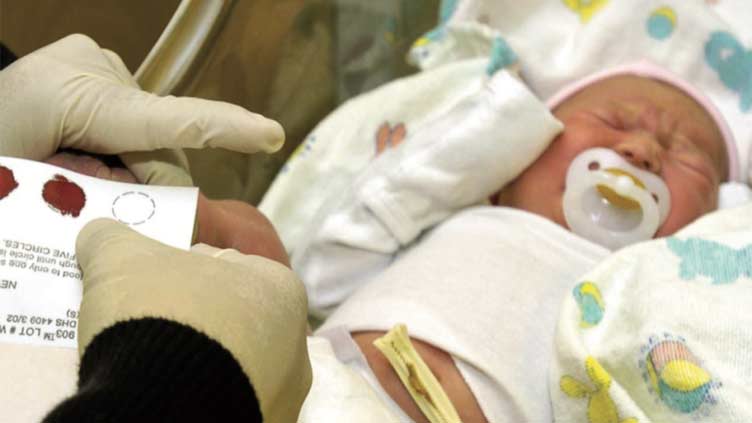Study Begins on Genetic Testing of Infants for Diseases: The Benefits and Concerns

Study Begins on Genetic Testing of Infants for Diseases: The Benefits and Concerns
ISLAMABAD, (Online) - A 2-year study on genome sequencing is getting underway in England to determine the benefits of diagnosing diseases at birth.
The research, done by Genomics England, is designed at diagnosing about 200 rare diseases early to ensure faster access to treatment.
The study will sequence the genomes of 100,000 babies, exploring the cost-effectiveness of doing so early as well as how many parents are willing to accept the results, according to a story in The Guardian.
Scientists will only search babies’ genomes for genetic conditions that would surface during early childhood for which effective treatment is already available.
The sequences would also be put on file, possibly allowing for more testing that could identify untreatable adult-onset conditions or other genetic traits down the line.
It could also potentially save parents and the healthcare system money by heading diseases off with early treatment, researchers said.
Genetic childhood diseases
Most diseases are only treated once symptoms develop in a child and can take months or years to test and diagnose, researchers said.
One such condition is biotinidase deficiency, a disorder in which the body can’t recycle the vitamin biotin. When left untreated, the results can be seizures and delays in reaching developmental milestones. Affected children can also have vision or hearing problems, but early diagnosis via genetic testing and treatment with biotin supplements may help prevent it.
“At the moment, the average time to diagnosis in a rare disease is about five years,” Dr. Richard Scott, the chief medical officer at Genomics England, told the Guardian. “This can be an extraordinary ordeal for families and it also puts pressure on the health system. The question this program is responding to is: ‘Is there a way that we can get ahead of this?’”
According to the Guardian, about 3,000 children in the United Kingdom are born with treatable and rare conditions that could be detected using genome sequencing. Babies are now tested via heel prick to test blood for nine rare but serious conditions, including cystic fibrosis and sickle cell disease.
In the United States, all newborns are genetically tested at birth, also through blood taken from the heel. The test is used to identify if the baby has any one of many genetic disorders, including phenylketonuria (PKU), sickle cell disease, and congenital hypothyroidism.
What experts think of genetic testing of infants
Nathan Tucker, Ph.D., an expert on genomics and an assistant professor at the Masonic Medical Research Institute in Utica, NY., told Healthline the research could be groundbreaking.
“For example, we might screen family members if there is a known heritable, and actionable, condition found in the parents,” Tucker said. “It’s truly testing the broad applicability of prospective genetic screening in a way that has not been done before.”
Tucker added that the results “from the small set of genes they will screen will yield clinically actionable results, meaning these children will have earlier interventions and hopefully better outcomes than if we waited to screen at a later time or after a clinical diagnosis.”
Concerns over genetic data
The UK researchers said information from the tests would remain confidential and be used only for the intentions stated in the study.
Tucker said this is important.
“There is always a risk of privacy concerns for all data used in clinical care, genetics included,” he said. “There are also vigorous debates in the genetics community about returning incidental findings. In this case, they hold onto other variant data with an option to examine them at a later time. For example, BRCA mutations for cancer.”
There are also concerns over results being held against people when it comes to getting health insurance or other issues.
“Other than privacy and security issues, there are risks to providing information not related to a patient’s current health. Not all individuals want information unrelated to their current health,” said Dr. Jason Park, a professor of pathology at the Eugene McDermott Center for Human Growth and Development at the University of Texas Southwestern Medical Center, told Healthline.
“In the U.S. we currently have protection from genetic discrimination in employment and health insurance – (the) Genetic Information Nondiscrimination Act of 2008 (GINA),” Park told Healthline. “However, protections from genetic discrimination could be reversed in future legislation. It will be difficult to make private genetic information that has already populated a patient’s electronic medical records.”
Park told Healthline there are also concerns about how the information could be used by law enforcement.
“In addition to identifying genetic variation related to diseases, whole genome data can be used to derive the information for the human identity testing, which is utilized by forensics and law enforcement,” he said. “Without proper security, whole genome datasets could reveal patients/participants and their biologic relatives in searches such as used for the identification of criminal suspects.”

